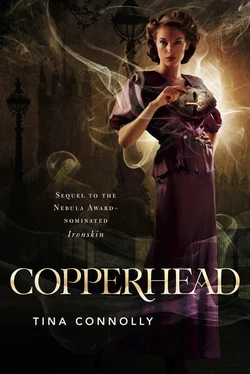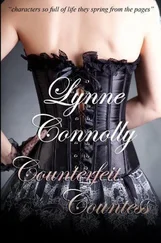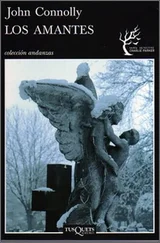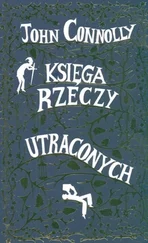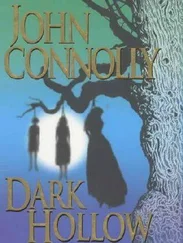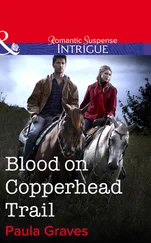“Leave him,” he said. “We’re going to get Jane.”
Helen set down her toast with trembling fingers. “I may have agreed to marry you, but I didn’t agree to do everything you ordered,” she said.
“I’m not ordering,” Alistair said. “You’re being irrational. It must be those horrid folks you’re hanging around with—Jane and her bluestocking friends, those traitors. If she’s in the dwarfslum, it’s probably because she’s in league with those disgusting creatures.” He looked over her head, thoughtful. “Yes, she’d probably be just the sort to take up with one of them, now that she’s no longer deformed. Miscegenation would be nothing to her.…”
That was the point that made her snap.
She turned on him and said softly, “You will apologize now.”
She watched until his eyes went glassy, and then he said, “I’m sorry. I am.”
The decorative nonsense was burned away. “Mary, take Tam from the room, please,” Helen said softly. As the door shut behind them she said, “I hold to my end of the marriage contract. I see no reason for me or my family to be treated like this.”
“Of course not,” he said.
It was heady, saying these ridiculously domineering things. She could spout off anything she cared to and make him agree with her. It was as if someone had had a weight on her all this time and had just pulled it off. And she found that she was twice as tall as she thought.
“I can go where I want, and if there’s danger I can damn well walk into it if I want,” she said. “I am in charge of my own safety.”
“You are,” he agreed.
The things Jane and Frye and Rook had said all came bubbling up. She didn’t even know they had come in and registered.
“We are married, but you don’t own me,” she said.
Alistair sank to one of her tufted chairs. His eyes looked concerned, and she wondered if the changes she was effecting would last while she was gone, or wear off when she turned her back. She found at the moment she didn’t really care.
“I’m going down to a place that isn’t safe for children,” Helen said. “You will watch Tam. Send word to his father that he can stay over. You can”—she cast around—“play dominoes with him, look at maps, catch bugs. That sort of thing. You will not leave him alone. You will not, I don’t know, take him out back and teach him to smoke cigars.”
“Of course not,” said Alistair, and he sounded shocked. She thought that was an interesting wrinkle she had introduced, that she could make Alistair sound shocked.
“Good,” Helen said. “Ask Mary to help you. She has a bunch of little brothers. Now I am out the door.”
“Helen?” said Alistair. He sounded almost … humble. “When are you coming back?”
“When I discover what’s going on,” said Helen. She looked at him, sitting meekly on the small chair. His face was Alistair’s, but he wasn’t anyone she knew. It was the opposite of a mask, as if the physical body of Alistair was a mask for something else, something Helen had created and put into animate Alistair.
She supposed it should give her the creeps. At the very least she should feel guilty, unconscionably guilty, so very guilty that she couldn’t possibly leave the house.
Instead she gave him one more tweak. “Don’t drink any of that whiskey,” she said.
“No, Helen.”
“Good,” she said. She blew him a jaunty kiss. “Don’t wait up.”
* * *
There was a mess of factories and warehouses by the statue of Queen Maud on the pier, but only one was lit blue in the windows. The sharp lines of the factory contrasted against the misty evening as Helen crept closer through muck and stench to peer through a cracked dirty window. Inside she could see … cages? Yes, rows of iron-barred cages, she thought, and surrounding them a misty blue haze. Helen squinted through the greasy glass. The blue haze almost seemed to have forms in it—as if it were people dancing and talking and running. Helen stepped away from the warehouse and into the shadows of the building opposite, puzzled by the blue-lit windows. Did nobody care that the warehouse seemed to be fey-infested? Or were they just being cautious? People passing by the warehouse didn’t give it a second glance, though they did seem to be giving it a wide berth.
The door was locked. She went around and around the building until at last she found a window ajar. It was head-height, but over some piles of rubbish and cans she thought she could use. The old Helen would have gone home, but this Helen adjusted the skirt on her herringbone suit and climbed up, prised the window open, and slid on through. There was a table beneath the window and so that side was easy after all.
The warehouse was big and dim and crowded, as if it were concurrently being used both for shipping storage and illicit fey activity. The window that she had come through was about in the middle of the long rectangle, and it was right under a duct blowing hot air—surprising that the warehouse was heated. The half of the building on the right, toward the wide double doors, was crates and machinery and all manner of piles of things. On the left were the cages, and the thin blue fog.
They were big cages, big enough to hold a person, and they lined the back half of the heated warehouse, competing for space with more crates, machinery, and junk. There were no good angles from which to see everything at once; Helen crept carefully around teetering piles, expecting something to leap out at her at any minute. A mouse skittered in front of her, and she jumped back against a cage, heart hammering fast. The blue fog crept around the cages, avoiding the iron bars, curling around her fingers. She grimaced and fought down panic. Rook had reminded her that a little bit of fey would not hurt anyone—was itself hurt, in a manner of speaking. Come to that, what was the blue fog, exactly? It was not as solid as the shimmery pieces of fey that lined the city. No, it was more vaporous even than that, as if a fey had been blown to smithereens.
There was a square hole cut from the center door of the cage—not quite big enough for a person to fit through. Over the hole hung a dented metal funnel mounted to a pale oval. A rubber hose snaked out of the funnel, and she followed it around piles of boxes, heart again hammering in her throat until she found where it ended.
Grimsby’s machine.
There was the large cube of wrought iron she had seen at the meeting. In the center was the ball made of writhing curls of copper. Wired inside of the cube were the ends of dozens of these rubber hoses, all snaking through the bars and away into the warehouse. The blue fog drifted lazily around her, and she remembered Grimsby blasting that small fey to a million bits of blue, and she thought she might be sick.
She tried to wave the fog away—stop breathing it in—tried to move away from the box, but she stumbled against all those snaking tubes, and as she put her hand out for balance it went right between the wrought iron and into the cube, and she touched the coiled copper snakes.
A chaotic swirl of confusion, a whirlwind of colors. Helen felt pulled in a million directions at once. She was seeing things, so many things, and her eyes couldn’t make sense of the torrent of images that attacked her.
She pulled back, stood up.
Slowly the warehouse resolved. Breathing heavily, she let the chaos of color die away. What had she seen? Flashes of the city, she thought. Lots of blue. Faces, voices. Stronger—a building, perhaps something like this warehouse?
Yes, she had a feeling that the warehouse itself had flashed through her mind. She narrowed her eyes, remembering the demonstration at the meeting. Grimsby had used the machine to capture a fey. Used it to destroy a fey. What else could it do? She remembered Niklas saying that he had made the machine and turned it over to Grimsby for further tinkering.
Читать дальше
